If you are looking for a delicious and nutritious honey, check out Manuka Health Raw Unpasteurized Honey. This Honey is sourced from Manuka trees in New Zealand. This Manuka Honey from Costco features an MGO scale of 253, UMF 10+, made with raw unpasteurized unifloral goodness. What benefits does Manuka Honey have? Is Manuka worth the price? Is this brand legit? Read on for my review below.
Welcome to the Honey Review. If you’re new go ahead and subscribe for updates on all my future reviews.
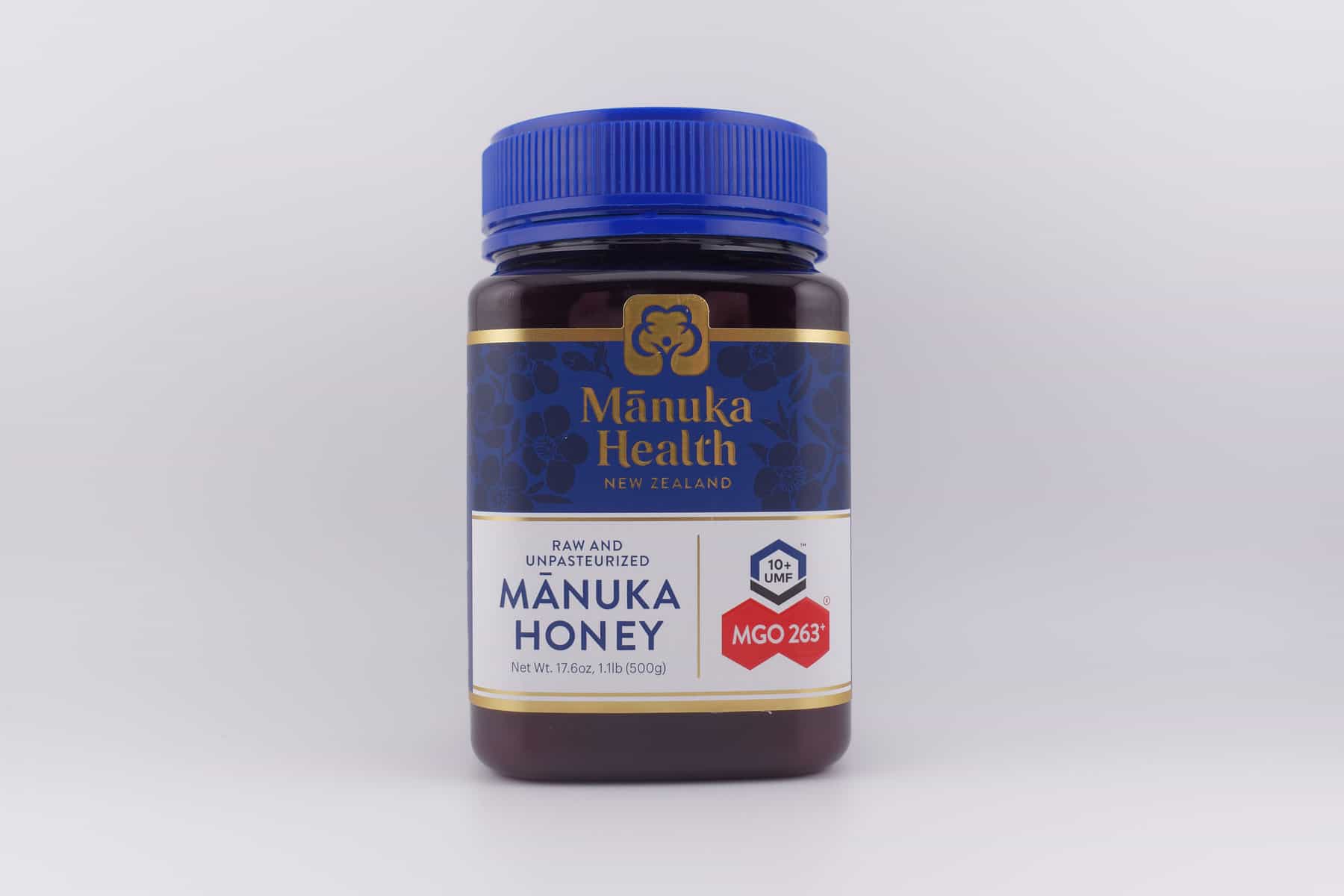
-
Honey – New Zealand Manuka, Liquid with no crystallization.
-
Color – Golden Amber with notes of Mahogany.
-
Aroma – Slightly floral with musty notes.
-
Flavor – Warm Caramel with a medicinal and earthy taste.
-
Texture – Viscous, thick and buttery.
DIsclaimer: This is not a sponsored Post. I bought this from Costco, and wanted to share my experience.
Who is Manuka Health?
Mānuka Health was founded in 2006 by Kerry Paul, in the small rural town of Te Awamutu, New Zealand. The company has since maintained its headquarters there and Wairarapa with a $10 million processing facility. They still source all products locally to ensure quality control on their natural gifts from bees! Manuka Health focuses on providing customers with premium Manuka honey.
In addition to other unique wellbeing products like propolis, lip balm, royal jelly or skin care cream. This established compan has won awards for being the most trusted honey brand in Australia that is made up of more than 140 apiculture specialists. They’re products are internationally sold in more than 45 countries.

What Is Manuka?
Manuka honey has been used for centuries as a natural remedy to heal wounds and promote health. The three phytochemical markers unique in Manuka are methylglyoxal, dihydroxyacetone, and leptosperin. These chemicals work together to optimize the body’s defenses against infection by microbes or anti-inflammatory properties.
This provides reduced swelling from inflammation while also acting like an antioxidant on cells. These combine to prevent free radicals before they can damage healthy tissues. The FDA has cleared Manuka for its antibiotic and anti-inflammatory properties. Studies have demonstrated its ability to inhibit a variety of bacterial species and facilitate wound healing.
The Manuka Tree is essential to New Zealand’s ecosystem. Being a vital forest crop and aiding in soil erosion. Manuka Health has committed to planting 1 million Manuka Trees by 2025.

Manuka Honey contains over 2,000 individual natural compounds.
20x more than some conventional honey varieties (even local specialty honeys).
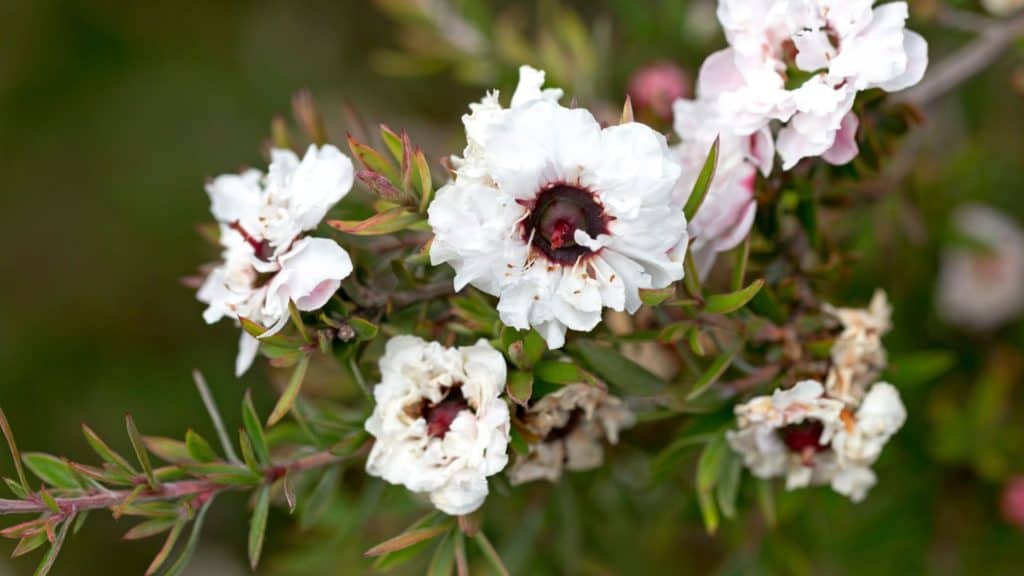
Bees are only able to collect nectar from the flower for 5 days within 6 weeks.
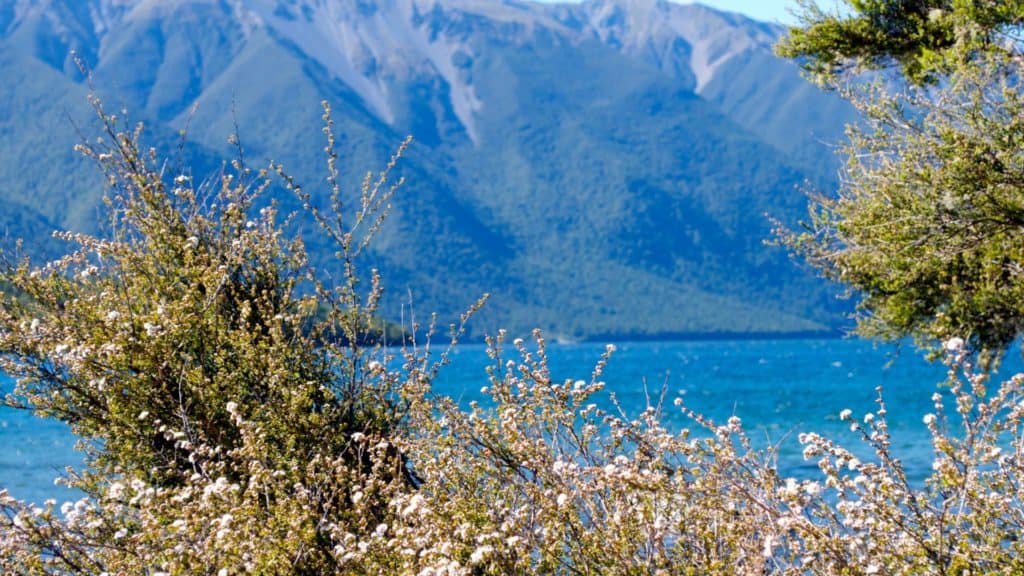
The Manuka bush is resilient, but even the most delicate flower can be defeated by variations in climate or rainfall. Bees have trouble harvesting honey when there’s not enough time for pollination and growth because of weather extremes. These weather patterns can keep them away during bloom window periods (which contribute towards variable prices).
It’s the nectar from a manuka flower that makes this honey so special. It contains an active compound called Methylglyoxal (MGO). MGO has been shown in studies to have anti-inflammatory properties and reduce pain medication needs.
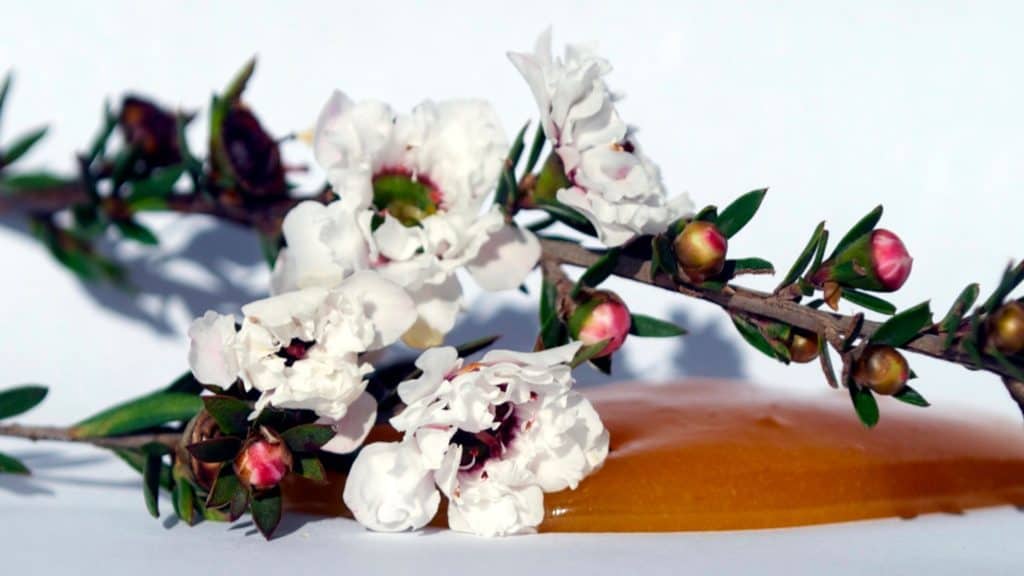
What Is MG or MGO?
Methylglyoxal (MG or MGO) stands out because it’s naturally occurring – meaning there are no pesticides needed when producing it;.
Who Discovered Methylglyoxal?
The MG rating system is a way to measure how many milligrams of MG are present in 1 kilo. MG or Methylglyoxal was found by Professor Thomas Henle. The measurement helps determine if the manuka honey has a strong balance or low count of Methylglyoxal.
Manuka Health developed the MGO scale.
In 2008, Mānuka Health developed what is now known as ‘the gold standard’ for measuring the potency of honeys. This discovery led them on an international venture to provide an accurate way to source and grade Manuka products.
What Is UMF?
The Unique Manuka Factor (UMF) is an indicator of purity and quality of honey. The (UMF) grading system reflects the MGO concentration in Manuka honey sold commercially. UMF ranges from 10 to 25, the higher the rating, the more potent and of course, the more expensive the honey. Manuka honey that scores UMF 10+ is considered potent enough for medicinal use.
Read the science on MGO and UMF here.
Manuka Health uses advanced technology with their Partner Oritain for trusted certifications Via QR codes. You can be confident about where your purchase comes from – all while enjoying it as soon as possible!
The Coolest Traceability System
Each jar has a Trust Code – which is linked to the birth certificate of that specific batch. Manuka Health can trace back every single shipment from its true origin!
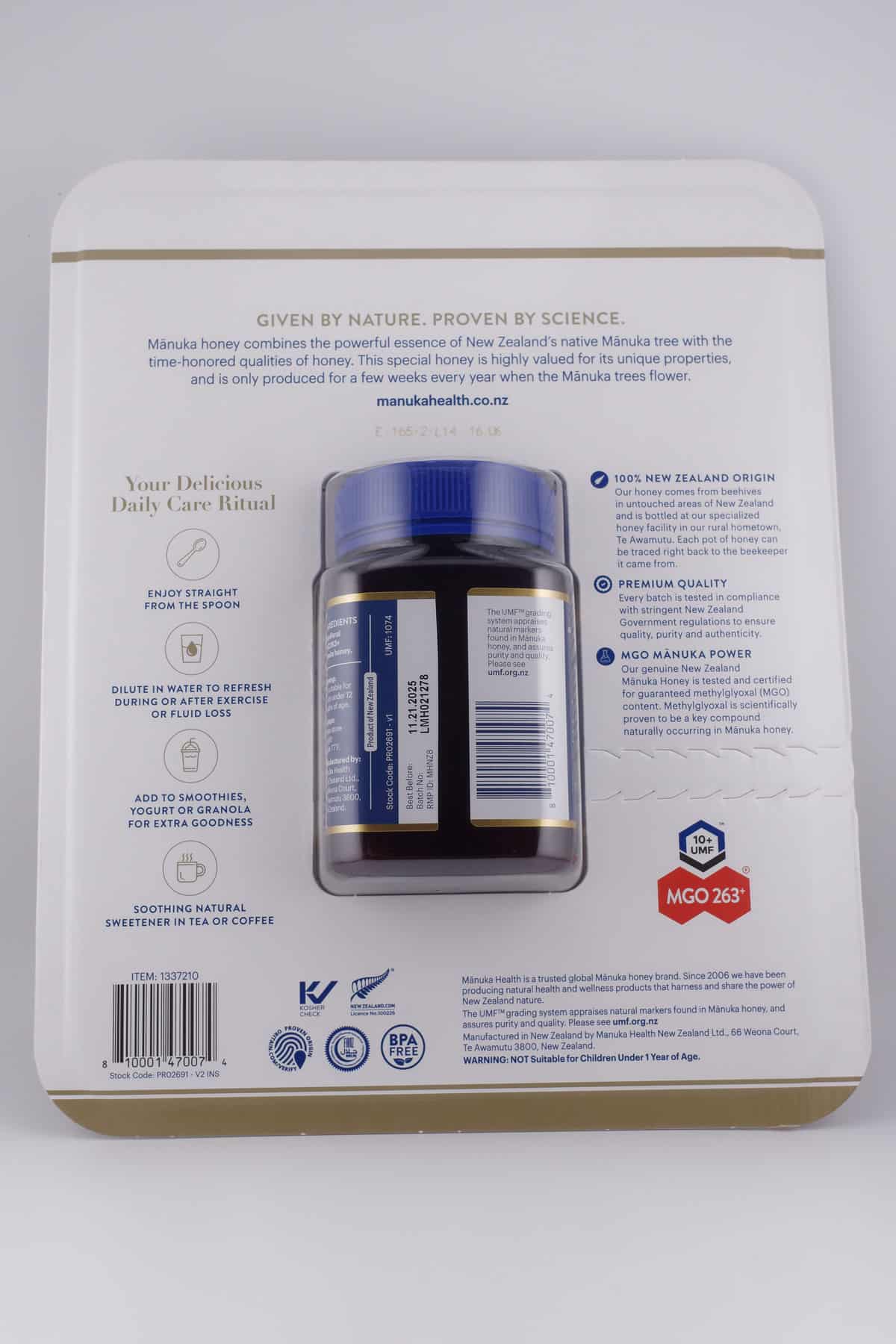
My Jar didn’t include a QR Trace code. I’ve contacted Costco customer support, and emailed Manuka Health as it should include a QR Trace code.
Manuka Health replied to my email inquiry and stated that this may likely be an older batch that was made before the QR Trust Code was fully incorporated. They were also able to verify the traceability with the Batch Number listed on the jar proving that my jar of Manuka was sourced from Manuka Health. You can find this batch code on the left side of the label on the back of the jar. QR Trace Codes are printed on the lid of the jar. They sent an email attachment with a certificate that was actually really cool to see.
4 out of 5 Manuka Honey Jars are Fakes.
In 2018, a class action lawsuit against Trader Joe’s Co involved the retailer of falsely marketing its “100% Manuka Honey.” They found that it only contained 50% of actual Manuka Honey.
Unfortunately, The court dismissed the lawsuit in Trader Joe’s favor because consumers were unlikely to be deceived by the label because it is impossible to produce a honey made from only one flower source.
Not true, Monofloral or Unifloral yields exist. Hence why the strict wording on Manuka, Sourwood etc. Which is why they developed the UMF and MGO scale. This case is an example of ignorance and money over standards, which further inflates the problems.
“There is a stockpile of 15,000-30,000 tons of honey. Typically, 11,000-13,000 tons would be sold in a year.
Karin Kos, chief executive of Apiculture New Zealand
And It Only Got Worse.
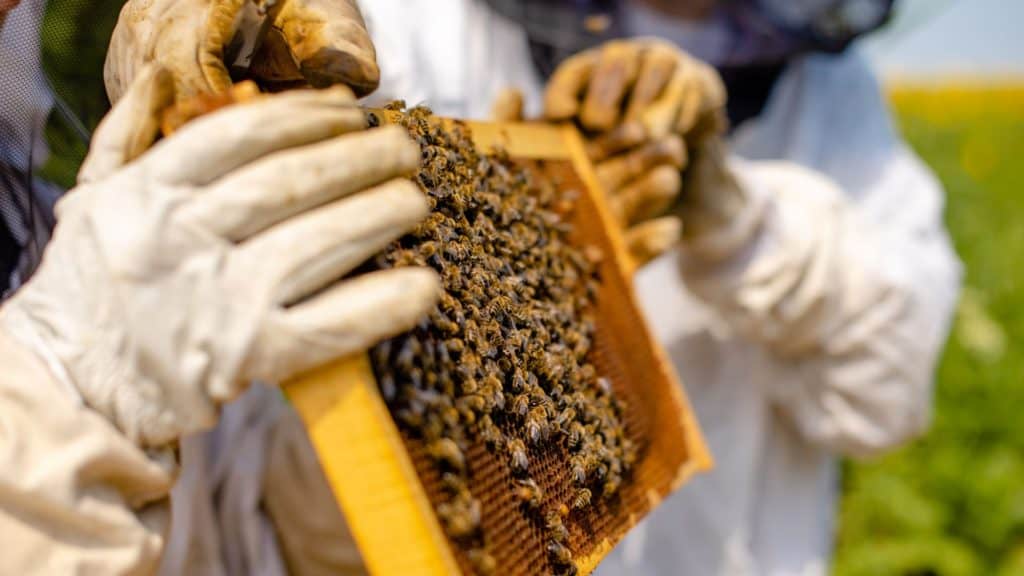
The industry sells more jars of Manuka Honey than New Zealand actually produces. Because Manuka bloom only last’s a month at most, there is no way all these Manuka producers are using legitimately sourced Manuka Honey. Honey is typically blended to increase volume, to increase sales. To make matters worse, it oversaturated the market with a boom in beekeeping. Currently, New Zealand is sitting on insane amounts of mostly fake honey with rising export prices.
A similar story for our own Sourwood, based out of the Appalachian Mountains. As well as most Honey here in the States.
Beekeepers overall have plummeted in the US by as much as 1/3 since 1940, as farming trades aren’t as profitable as they once were.
Meanwhile, Hobbyists and Honey Packers have contributed ten fold to the apiculture industry.
Eventually we sell more than we can provide and that turns to unethical beekeeping and processing methods.
Unfortunately, blended or adulterated Honey is a massive issue worldwide.
Costco Prioritizes Product and Brand
As a Costco member, I have the benefit of getting quality assurance with their products. Out of all the choices they could have for Honey and Manuka Honey, they put Manuka Health on their shelves. If I was to choose a company to represent Manuka Honey, Manuka Health would be it.
In fact, Costco currently only has two brands available; Comvita and Manuka Health. Likely the most trustworthy brands available. Unlike Trader Joes, Costco doesn’t want to mislead their Customers or assume what they’re looking for in a label. It’s also very expensive to import Manuka Honey, so having limited but reliable vendors is smart.
Alternatives:
If you’re not a fan of Manuka Honey, Consider trying Buckwheat Honey, Sourwood, or my most recent favorite Doom Bloom Honey made from Spotted Lanternflies.
Manuka Honey FAQ’s
- What is manuka honey? Manuka honey is a type of honey that is sourced from the nectar of the manuka tree, which is native to New Zealand. This honey has unique antibacterial properties thanks to a compound called methylglyoxal (MGO), which is found in high levels in manuka honey.
- What are the benefits of manuka honey? The antibacterial properties of manuka honey make it a popular choice for wound healing and preventing infections. It has also been found to have anti-inflammatory properties, which can help with digestive issues and relieve sore throats. Additionally, manuka honey is high in antioxidants, which can help protect the body against oxidative stress.
- How can I use manuka honey? Manuka honey can be used in a variety of ways, such as a spread on toast or mixed into tea or hot water. Some people use it as a natural sweetener in baking recipes. It can also be used topically on wounds or blemishes to encourage healing.
- How do I choose [a jar of] manuka honey? When choosing manuka honey, you want to look for high MGO levels on the label. The higher the MGO levels, the more potent the honey’s antibacterial properties will be. Additionally, look for honey that is UMF certified, as this indicates that the honey has been independently tested and verified for its quality.
- What is the difference between raw and processed manuka honey? Raw manuka honey has not been heated or processed in any way, so it retains all of its natural enzymes and nutrients. Processed manuka honey, on the other hand, has been heated and filtered to remove impurities and extend its shelf life. However, this process can also remove some of the beneficial compounds found in raw manuka honey.
- Is manuka honey safe for everyone? While manuka honey is generally considered safe for most people, those with allergies to bees or honey should avoid it. Additionally, children under 12 months old should not consume honey due to the risk of botulism.
- How long does manuka honey last? Manuka honey can last for a very long time if stored properly. It is recommended to store honey in a cool, dry place away from direct sunlight. As long as the honey is stored properly, it can last for several years.
- Where can I buy [quality] manuka honey? You can find quality manuka honey at health food stores, specialty food stores, online retailers or Costco. Look for brands that are UMF certified, or ones that have high MGO levels indicated on their label. Be cautious of very cheap options, as they may not be of the highest quality.
Manuka Health Raw Unpasteurized Honey from Costco
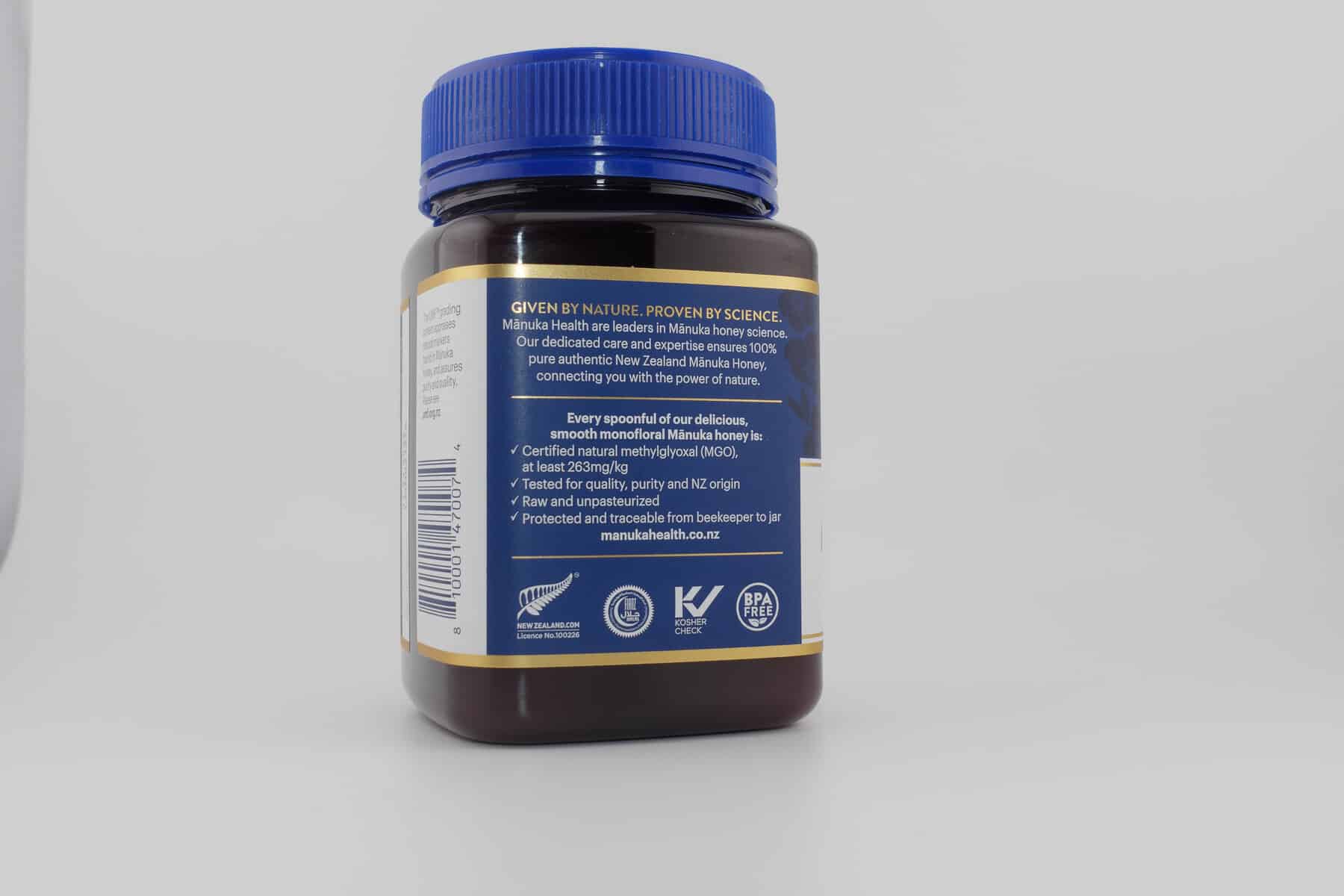
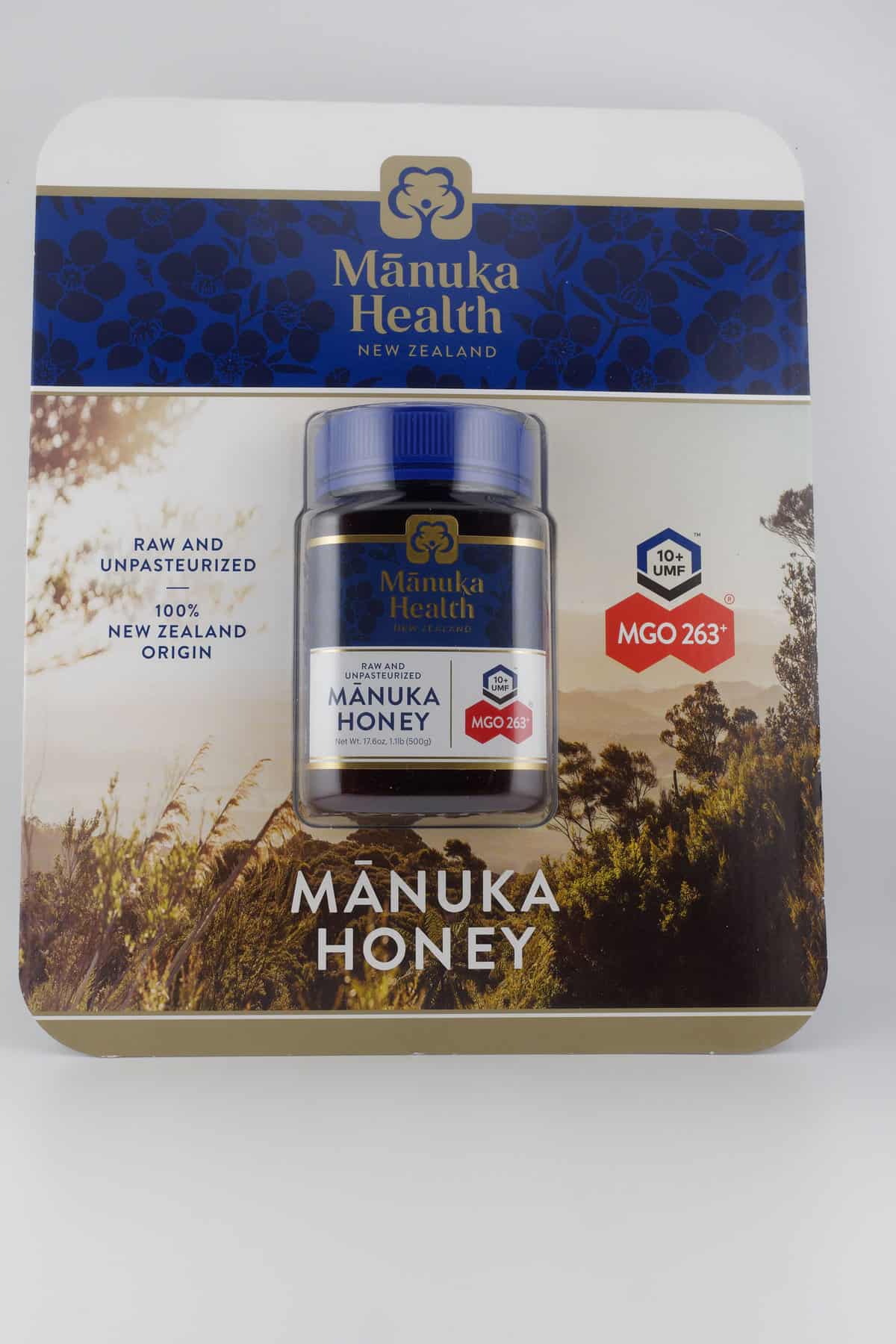
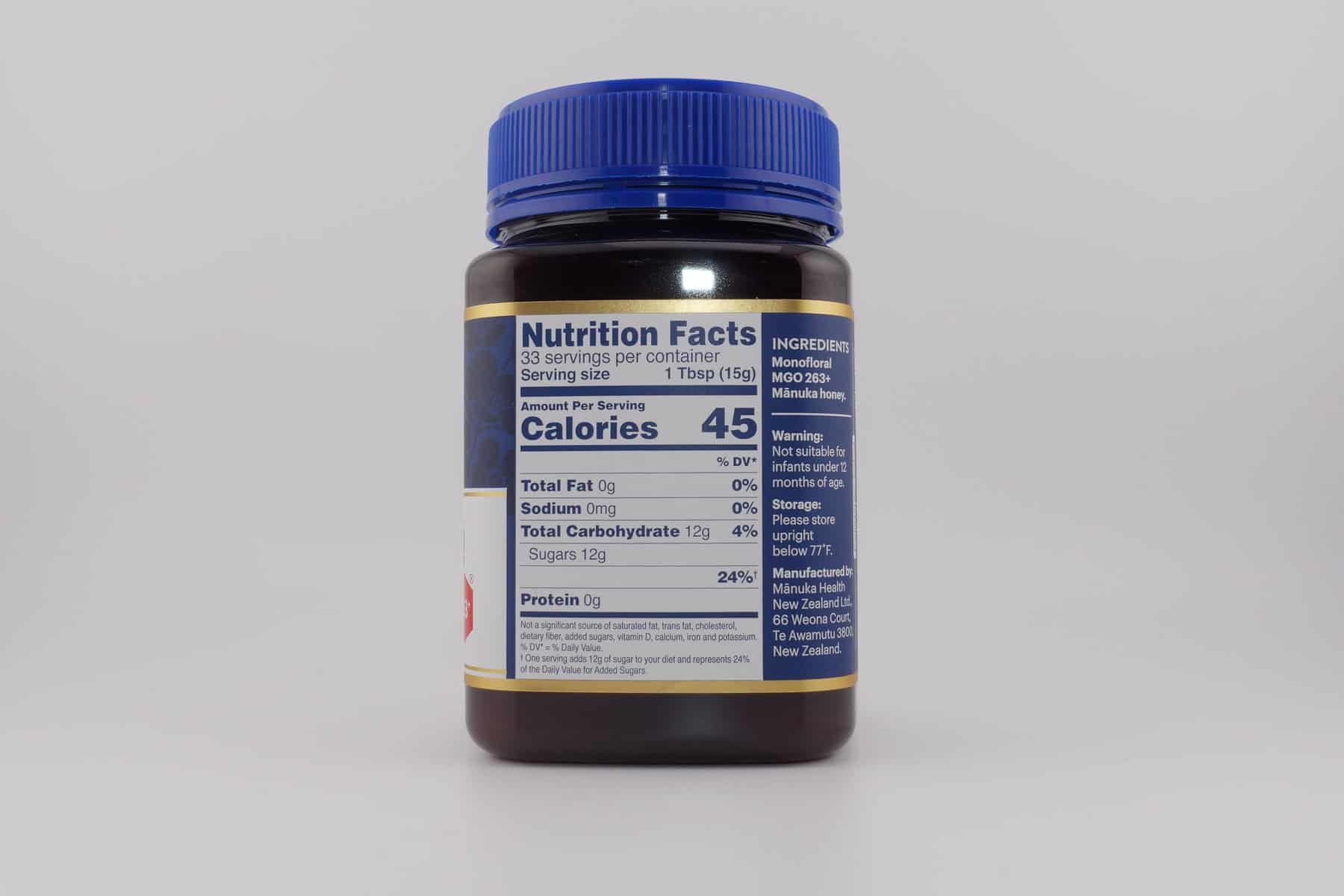


Manuka Health Raw Unpasteurized Honey
Review Summary
I purchased this Manuka Health Raw Unpasteurized Honey from Costco for about $25 on sale. They’ve had this brand for a long time, but I wasn’t aware of Manuka’s health benefits or Costco’s budget friendly price.
Thorough inspection revealed transparent branding, with a plastic jar and twist top. Opening this fresh, revealed a plastic like turpentine scent with a classic must of Honey. Further visual inspection revealed a dense, dark amber and light auburn tone. At 70 degrees indoor, this Honey almost has a color of consistency of Caramel.
The flavor of this Honey is quite honestly not for me. I don’t hate it, but it’s not something I’m eager to take another spoon of. This has a medicinal plastic-like yeasty body with a malty earthiness that sits dry in your throat. There’s a touch of acidity in there that settles with a tickle.
Texture wise, its dense almost gritty like an applesauce when you look at it. Indoor temps of 70 degrees has this honey thick with super fine crystallization but very smooth like a caramel that melts slow on the tongue. Great texture.
I have the jar with the MGO level of 263 that is suitable for daily well being. I don’t think I’ll be taking this every day like a vitamin, but I do try to incorporate Manuka Honey. Especially during this odd season as my body doesn’t respond well to cold and humid weather. I’m happy I was able to finally try Manuka Honey, and for a great price. I loved diving deep into Manuka Honey and Manuka Health. Consider trying out their products by clicking below.